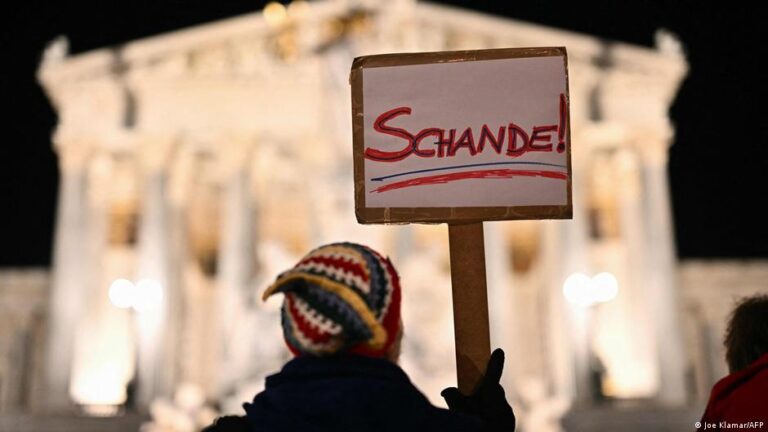About 200 protesters demonstrated in front of the parliament building in Austria’s capital Vienna on Tuesday evening.
They were rallying against an event called the Dinghofer Symposium that they say is antisemitic.
Parliamentary speaker Walter Rosenkranz, who hosted the event, had attracted massive criticism in the past weeks for going ahead with the symposium despite calls to cancel it.
Some protesters held up placards that read “No place for antisemitism” or “Shame.”
“Dinghofer was an antisemite and a Nazi party member during World War II,” said Lia Guttmann, co-president of the Austrian Union of Jewish Students group.
Guttmann said the protesters were holding a “counter-symposium” outside parliament against what she called “historical amnesia.”
What is the controversy about?
The Dinghofer Symposium is named after Franz Dinghofer, who was Austria’s vice chancellor in the 1920s.
Dinghofer was a self-proclaimed “radical antisemite” and a pan-German nationalist who became a member of the Nazi party during World War II.
FPÖ representatives counter that they remember Dinghofer as a statesman of the period between World War I and World War II.
The event, which has been held in parliament in the past, drew criticism from Austria’s Jewish community and major political parties, including the ruling three-party coalition.
Last week, more than a dozen historians said parliament was being made “the place of honorable remembrance for a declared antisemite”.
Event hosted by far-right parliamentary speaker
Walter Rosenkranz is a senior member of Austria’s far-right Freedom Party (FPÖ).
He was elected president of the National Council, Austria’s lower house of parliament, last year after the FPÖ topped legislative elections.
He has also faced widespread criticism for his membership of Vienna’s Libertas student fraternity, which is known for its strident pan-German nationalism.
The country’s main Jewish organization has ruled out working with him.
Speaking to Austria’s national broadcaster ORF on Tuesday, Rosenkranz defended holding the event.
He said that “despite all the dark sides” in a person’s biography, it was also possible to “see the positive aspects.”
The symposium was held just days after Austria remembered the pogroms of November 9-10, 1938.
That is when the Nazi regime conducted a wave of coordinated attacks against Jews in Germany, as well as in Austria, which had been annexed by Nazi Germany just months earlier. Many historians mark the November pogroms as the foreshadowing of the Holocaust.
The wave of attacks has historically been referred to as Kristallnacht, or the “Night of the Broken Glass,” but this term has fallen out of favor in Germany, as it is widely seen as downplaying the scale of the violence.
Edited by: Saim Dušan Inayatullah


